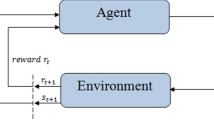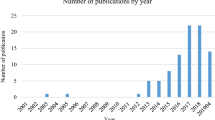Abstract
This paper investigates flexible job-shop problem (FJSP) with preventive maintenance activities. Makespan is considered as an optimal criterion for this problem. The contribution of this study could be divided into two parts: (1) since the preventive maintenance policies are not pondered in most prior FJSPs, we apply an enforceable and easily extendable preventive maintenance policy on FJSP; (2) in order to figure the problem out, an effective learnable genetic architecture, LEGA, which is established in previous articles for FJSPs, is expanded to integrated FJSP and preventive maintenance which is named preventive maintenance and LEGA. All operators and parameters are then calibrated by means of the Taguchi experimental design. For the evaluation of the proposed architecture, a benchmark with conscientious care is employed.
Similar content being viewed by others
References
Aggoune R (2004) Minimizing the makespan for the flow shop scheduling problem with availability constraints. Eur J Oper Res 153:534–543
Barnes JW, Chambers JB (1996) Flexible job shop Scheduling by tabu search. Graduate program in operations research and industrial engineering. Technical Report ORP 9609, University of Texas, Austin
Brandimarte P (1993) Routing and scheduling in a flexible job shop by tabu search. Ann Oper Res 41:157–183
Cassady CR, Kutanoglu E (2003) Minimizing job tardiness using integrated preventive maintenance planning and production scheduling. IIE Trans 35(6):503–513
Chen H, Ihlow J, Lehmann C (1999) A genetic algorithm for flexible Job-shop scheduling. IEEE International Conference on Robotics and Automation, May, Detroit, MI, USA 1120–1125
Cheng R, Gen M, Tsujimura Y (1996) A tutorial survey of job shop scheduling problems using genetic algorithms, Part I: Representation. Comput Ind Eng 30(4):983–997
Dauzére-Pérés S, Paulli J (1997) An integrated approach for modeling and solving the general multiprocessor job-shop scheduling problem using tabu search. Ann Oper Res 70:281–306
Gao J, Gen M, Sun L (2006) Scheduling jobs and maintenances in flexible job shop with a hybrid genetic algorithm. J Intell Manuf 17:493–507
Garey MR, Johnson DS, Sethi R (1976) The complexity of flow shop and job shop scheduling. Math Oper Res 1(2):117–129
Gopalakrishnan M, Ahire SL, Miller DM (1997) Maximizing the effectiveness of a preventive maintenance system: An Adaptive modeling approach. Manage Sci 43:827–840
Gopalakrishnan M, Mohan S, He Z (2001) A Tabu Search Heuristic for Preventive Maintenance Scheduling. Comput Ind Eng 40:149–160
Graves GH, Lee C-Y (1999) Scheduling maintenance and semi-resumable jobs on a single machine. Nav Res Logist 46:845–863
Ho NB, Tay JC (2004) GENACE: An efficient cultural algorithm for solving the flexible job-shop problem. In Proceedings of the congress on evolutionary computation CEC2004, 1759–1766
Ho NB, Tay JC, Lai EMK (2007) An effective architecture for learning and evolving flexible job-shop schedules. Eur J Oper Res 179:316–333
Hurink J, Jurish B, Thole M (1994) Tabu search for the job shop scheduling problem with multi-purpose machines. OR-Spektrum 15:205–215
Jain AS, Meeran S (1998) Deterministic job-shop scheduling: Past, present and future. Eur J Oper Res 113(2):390–434
Jia HZ, Nee AYC, Fuh JYH, Zhang YF (2003) A modified genetic algorithm for distributed scheduling problems. Int J Intell Manuf 14:351–362
Kacem I, Hammadi S, Borne P (2002) Approach by localization and multiobjective evolutionary optimization for flexible job-shop scheduling problems. IEEE Trans Syst Manuf Cybernetics C 32(1):1–13
Lee C-Y, Chen Z-L (2000) Scheduling jobs and maintenances on parallel machines. Nav Res Logist 47:145–165
Mastrolilli M, Gambardella LM (1996) Effective neighbourhood functions for the flexible job shop problem. J Sched 3:3–20
Mauguiere P, Billaut JC, Bouquard JL (2005) New single machine and job shop scheduling problems with availability constraints. J Sched 8:211–231
McCall JJ (1965) Maintenance policies for stochastically failing equipment: a survey. Manag Sci 11:493–524
McKone KE, Weiss EN (1998) TPM: planning and autonomous maintenance: bringing the gap between practice and research. Prod Oper Manag 7(4):335–351
Mesghouni K, Hammadi S, Borne P (1997) Evolution programs for job-shop scheduling. Proceedings of the IEEE International Conference on Computational Cybernetics and Simulation. October, Orlando, FL, USA 1:720–725
Naderi B, Zandieh M, Fatemi Ghomi SMT (2008) Scheduling sequence-dependent setup time job shops with preventive maintenance. Int J Adv Manuf Technol. doi:10.1007/s00170-008-1693-0
Naderi B, Zandieh M, Fatemi Ghomi SMT (2008) Scheduling job shop problems with sequence-dependent setup times. Int J Prod Res. doi:10.1080/00207540802165817
Nakajima S (1998) TPM: Introduction to TPM, Total Productive Maintenance. Productivity, Cambridge
Pezzella F, Morganti G, Ciaschetti G (2008) A genetic algorithm for the flexible job-shop scheduling problem. Comput Oper Res 35(10):3202–3212
Pierskalla WP, Voelker JA (1976) A survey of maintenance models: the control and surveillance of deteriorating systems. Nav Res Logist Q 23(3):353–388
Pinedo M, Chao X (1999) Operations Scheduling with Applications in Manufacturing and Services. McGraw-Hill, New York
Pinedo M (2002) Scheduling Theory, Algorithms, and Systems. Prentice-Hall, Englewood Cliffs, 2
Paulli J (1995) A hierarchical approach for the FMS scheduling problem. Eur J Oper Res 86(1):32–42
Qi X, Chen T, Tu F (1999) Scheduling the maintenance on a single machine. J Oper Res Soc 50:1071–1078
Ruiz R, García-Díaz JC, Maroto C (2007) Considering scheduling and preventive maintenance in the flowshop sequencing problem. Comput Oper Res 34:3314–3330
Sherif YS, Smith ML (1976) Optimal maintenance models for systems subject to failure-a review. Nav Logist Res Q 23:47–74
Taguchi G (1986) Introduction to quality engineering. Asian Productivity Organization/UNIPUB, White Plains
Vaessens RJM, Aarts EHL, Lenstra JK (1996) Job shop scheduling by local search. INFORMS J Comput 8(3):302–317
Valdez-Flores C, Feldman RM (1989) A survey of preventive maintenance models for stochastically deteriorating single unit systems. Nav Res Logist Q 36(4):419–446
Varela R, Vela CR, Puente J, Gómez A (2003) A knowledge based evolutionary strategy for scheduling problems with bottlenecks. Eur J Oper Res 145(1):57–71
Yamamoto M, Nof SY (1985) Scheduling/rescheduling in the manufacturing operating system environment. Int J Prod Res 23(4):705–722
Zribi N, El Kamel A, Borne P (2008) Minimizing the makespan for the MPM job-shop with availability constraints. Int J Prod Econ 112:151–160
Author information
Authors and Affiliations
Corresponding author
Rights and permissions
About this article
Cite this article
Moradi, E., Fatemi Ghomi, S.M.T. & Zandieh, M. An efficient architecture for scheduling flexible job-shop with machine availability constraints. Int J Adv Manuf Technol 51, 325–339 (2010). https://doi.org/10.1007/s00170-010-2621-7
Received:
Accepted:
Published:
Issue Date:
DOI: https://doi.org/10.1007/s00170-010-2621-7




